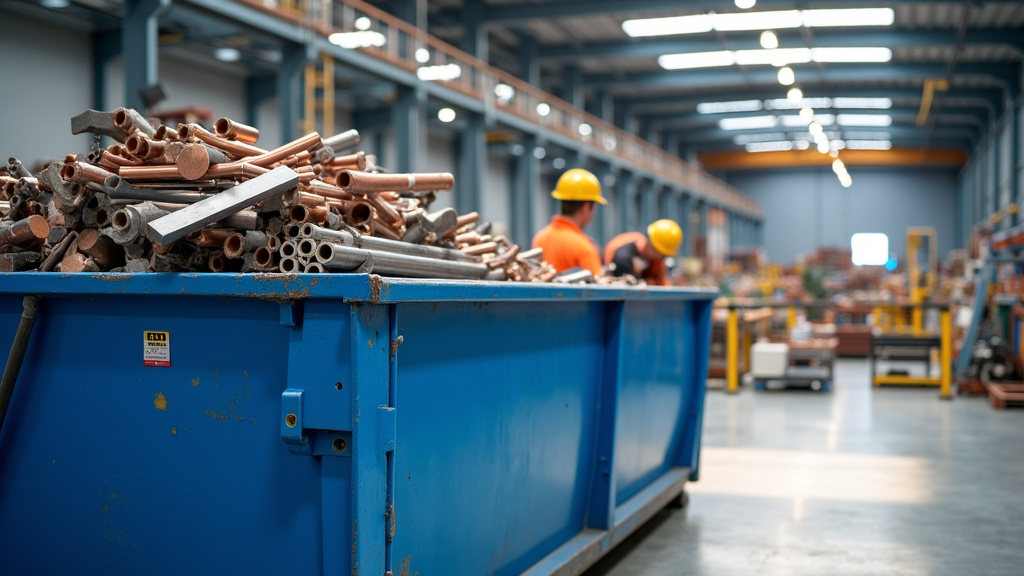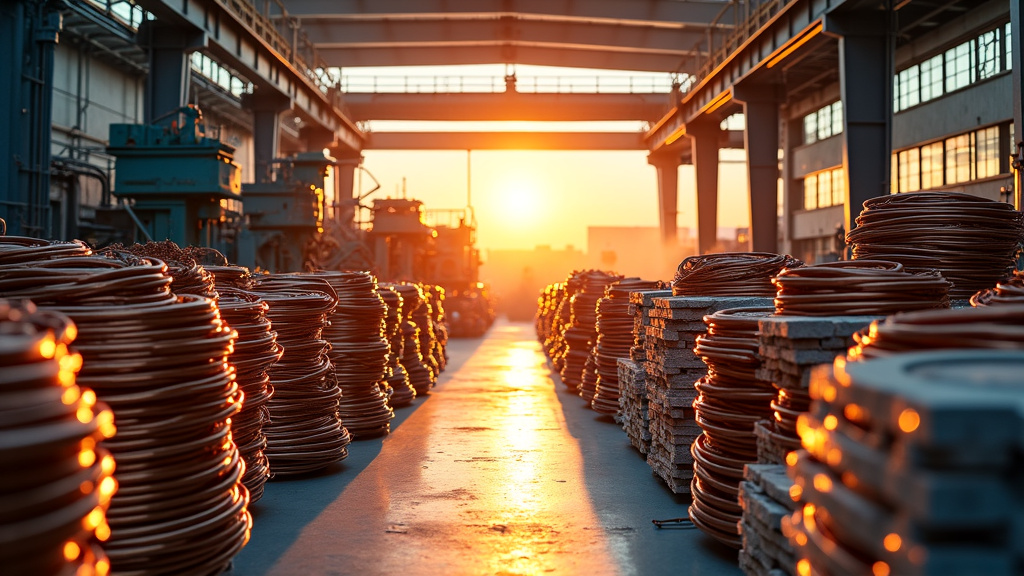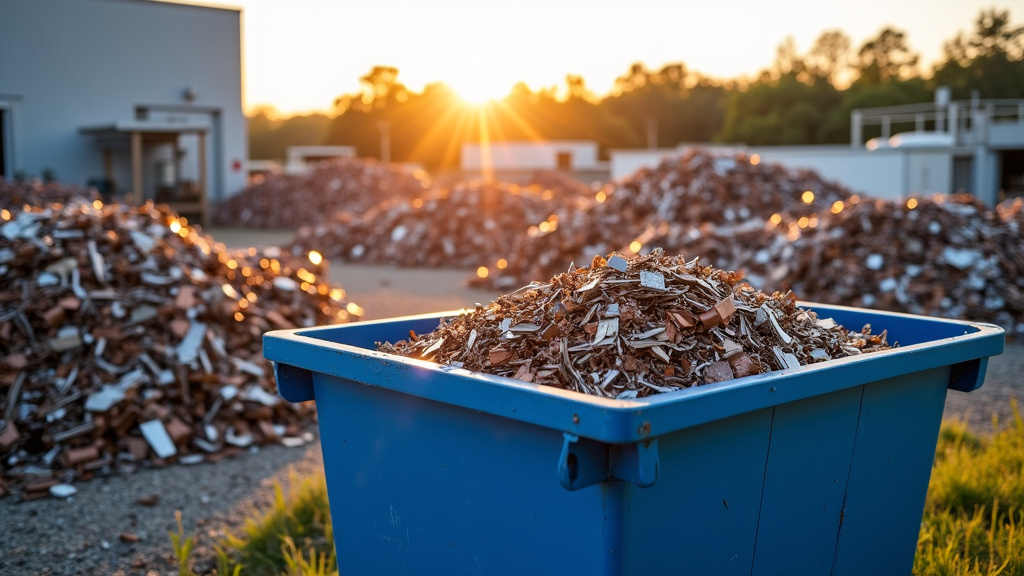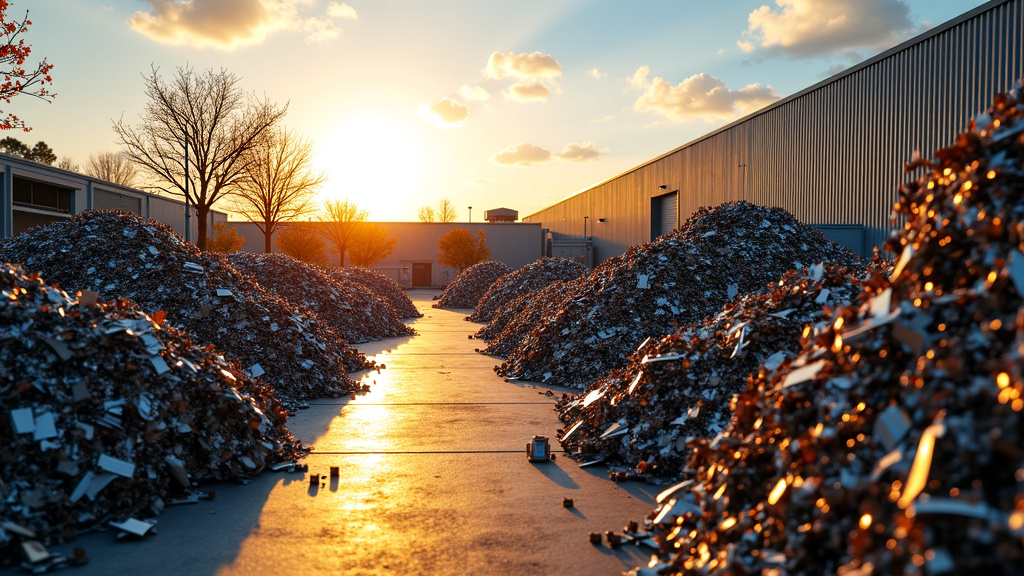5901 Botham Jean Blvd, Dallas, TX 75215
Maximizing Efficiency with a Dumpster for Scrap Metal
April 3, 2025The global scrap metal recycling market is projected to reach $86.11 billion by 2027, highlighting the importance of efficient scrap metal management.
Enter the unsung hero of industrial waste handling: the dumpster for scrap metal. This versatile container is essential for streamlined recycling processes, offering a centralized collection point that transforms waste management practices in construction sites and manufacturing facilities.
In an era where sustainability is crucial, the scrap metal dumpster emerges as a powerful ally against environmental degradation. By providing dedicated space for metal waste, these dumpsters facilitate the separation of recyclable materials from general refuse, significantly boosting recycling rates. This contributes to resource conservation and aligns with increasingly stringent environmental regulations.
Benefits of Using a Dedicated Scrap Metal Dumpster

Scrap metal recycling is a key component of responsible waste management for businesses and construction sites. Using a dedicated scrap metal dumpster offers advantages beyond simple waste disposal. Let’s examine the key benefits of this efficient waste management solution.
Improved Organization and Efficiency
A dedicated scrap metal dumpster streamlines waste management, creating a more organized work environment. By designating a specific container for metal waste, you eliminate the need to sort through mixed materials later.
This organization leads to increased efficiency on-site. Workers can quickly identify where to dispose of metal scraps, reducing time spent on waste management tasks. The clear separation also makes it easier for recycling facilities to process the materials, speeding up the entire recycling chain.
An organized system helps prevent valuable metals from accidentally ending up in general waste, ensuring all recyclable metals are appropriately processed, maximizing recycling and resource recovery.
Enhanced Safety on Work Sites
Safety is crucial in any work environment, especially in construction and industrial settings. A dedicated scrap metal dumpster helps maintain a safer workspace by providing a specific location for metal waste, reducing the risk of injuries from scattered metal debris.
Sharp edges, protruding nails, and heavy metal pieces pose hazards if left lying around. A dedicated dumpster encourages prompt disposal, keeping walkways and work areas clear of these dangers. This proactive approach to safety can lead to fewer accidents and a healthier work environment.
Proper containment of metal waste reduces the risk of environmental contamination. Some metals can leach harmful substances into the soil or water if not handled correctly. A dedicated dumpster helps contain these materials, protecting both workers and the environment.
Easier Sorting and Recycling
One significant advantage of using a dedicated scrap metal dumpster is simplifying the recycling process. When metals are pre-sorted at the source, it reduces the workload for recycling facilities, leading to higher recycling rates and better quality recycled materials.
Different types of metals often require different recycling processes. By keeping scrap metal separate from other waste, you ensure these valuable resources don’t end up in landfills. According to the Transportation Environmental Resource Center, proper sorting can significantly improve the efficiency of metal recycling efforts.
Furthermore, clean, well-sorted scrap metal often commands higher prices at recycling centers. This means that not only are you contributing to environmental sustainability, but you may also increase the potential return on your recyclable materials.
Environmental Compliance and Sustainability
Using a dedicated scrap metal dumpster helps businesses stay compliant with environmental regulations. Many jurisdictions have strict rules about the disposal and recycling of metal waste. By implementing a proper metal recycling system, you demonstrate your commitment to following these guidelines.
This proactive approach to compliance can help avoid potential fines and legal issues related to improper waste disposal. It also positions your business as environmentally responsible, which can be a significant advantage in today’s eco-conscious market.
From a sustainability perspective, recycling scrap metal conserves natural resources and reduces the energy required for metal production. By facilitating efficient recycling, dedicated scrap metal dumpsters contribute to the broader goals of resource conservation and reduced carbon emissions.
Cost Savings Through Efficient Waste Management
Implementing a dedicated scrap metal recycling system may seem like an additional expense, but it often leads to significant cost savings in the long run. Efficient waste management reduces disposal costs, as less material ends up in landfills where fees can be substantial.
Moreover, well-sorted scrap metal can be a valuable commodity. Many recycling centers pay for clean, sorted metal waste. By maximizing the quality and quantity of your recyclable metals, you can turn what was once a waste product into a potential revenue stream.
Improved organization and safety on work sites can also lead to indirect cost savings. Fewer accidents mean reduced downtime and lower insurance premiums. Additionally, a cleaner, more organized workspace often leads to increased productivity, further boosting your bottom line.
Environmental Impact of Proper Scrap Metal Disposal

Proper scrap metal disposal through dedicated dumpsters is essential for environmental conservation. By enabling efficient recycling and diverting waste from landfills, it provides significant ecological benefits beyond simple waste management.
One of the most impactful benefits of scrap metal recycling is conserving natural resources. According to the Institute of Scrap Recycling Industries, recycling one ton of steel saves 2,500 pounds of iron ore, 1,400 pounds of coal, and 120 pounds of limestone. This reduction in raw material extraction helps preserve ecosystems and biodiversity that would otherwise be disrupted by mining.
Energy efficiency is another key environmental benefit of proper scrap metal disposal. Recycling metals typically consumes 60% to 90% less energy compared to producing new metals from virgin ores. For example, recycling aluminum saves 95% of the energy required to produce new aluminum from bauxite ore. This decrease in energy consumption translates to reduced greenhouse gas emissions and a smaller carbon footprint for industrial operations.
Reducing Carbon Footprint Through Metal Recycling
The impact of scrap metal recycling on carbon emissions is significant. A study by the Environmental Protection Agency reveals that recycling metals can prevent the release of millions of tons of CO2 annually. Recycling steel alone saves over 90 million tons of CO2 emissions each year in the United States—equivalent to the annual emissions of nearly 20 million passenger vehicles.
Beyond carbon dioxide, proper scrap metal recycling also reduces the release of other harmful greenhouse gases. For instance, the decreased need for mining and processing raw ores leads to lower methane emissions, a greenhouse gas 25 times more potent than CO2 in trapping heat over a 100-year period.
Reducing landfill waste is another critical environmental benefit of dedicated scrap metal dumpsters. Metals can take centuries to decompose in landfills, potentially leaching toxic substances into soil and groundwater. By diverting metals from traditional waste streams, we conserve valuable landfill space and protect surrounding ecosystems from long-term contamination risks.
Promoting a Circular Economy
Proper scrap metal disposal supports the transition towards a circular economy model. Unlike the traditional linear ‘take-make-dispose’ approach, a circular economy keeps resources in use for as long as possible, extracting maximum value before recovering and regenerating products and materials at the end of their service life.
In the context of metals, this circular approach is effective due to the infinite recyclability of many metals without loss of quality. For example, aluminum can be recycled indefinitely, with 75% of all aluminum ever produced still in use today thanks to effective recycling practices. This longevity and reusability significantly reduce the environmental impact associated with metal production and consumption.
How Okon Recycling Can Help with Dumpster for Scrap Metal

In the bustling Dallas-Fort Worth area, businesses are constantly seeking efficient solutions for managing their scrap metal. Enter Okon Recycling, a century-old leader in the metal recycling industry, offering sustainability and expertise.
Okon’s customized dumpster solutions aren’t just containers; they’re a testament to over 100 years of industry knowledge. These tailored options cater to both large-scale industrial projects and smaller commercial endeavors, ensuring no scrap metal goes to waste.
What sets Okon apart is their commitment to sustainable practices. In an era where environmental responsibility is paramount, Okon’s approach to scrap metal management goes beyond mere collection.
Expertise That Spans Generations
Imagine partnering with a recycler whose experience dates back to 1909. That’s Okon for you. This longevity isn’t just a number; it’s a reflection of adaptability and continued excellence in the face of changing industry demands.
Their team’s deep-rooted knowledge translates into efficient processes, from the initial dumpster placement to the final recycling stage. It’s not just about removing scrap; it’s about understanding the unique needs of each business they serve.
For DFW businesses, this means access to a recycling partner who can navigate the complexities of various metal types and quantities with ease. Whether you’re dealing with aluminum, copper, or steel, Okon’s expertise ensures optimal handling and recycling.
Customization: The Key to Efficient Recycling
One size doesn’t fit all in scrap metal recycling. Okon Recycling understands this, offering dumpster solutions that are as unique as the businesses they serve. From compact containers for small workshops to industrial-sized dumpsters for large manufacturing plants, they’ve got it covered.
This customization extends beyond mere size. Okon considers factors like frequency of collection, type of metals, and even site-specific challenges. It’s this attention to detail that transforms scrap metal management from a chore into a streamlined, value-adding process for businesses.
By tailoring their services, Okon ensures that each client maximizes the value of their scrap metal while minimizing the environmental impact. It’s a win-win situation that businesses in the DFW area have come to rely on.
Environmental Stewardship in Action
In today’s world, responsible business practices are more crucial than ever. Okon Recycling doesn’t just talk about sustainability; they embody it. Their approach to scrap metal recycling is a masterclass in environmental stewardship.
By diverting metal from landfills, Okon plays a vital role in conserving natural resources. Their processes are designed to maximize recycling efficiency, ensuring that every piece of scrap metal gets a new lease on life. This commitment to sustainability isn’t just good for the planet; it’s good for business too.
Partnering with Okon means aligning your business with these eco-friendly practices. It’s an opportunity to enhance your company’s green credentials while also benefiting from efficient waste management. In an era where consumers and partners increasingly value environmental responsibility, this can be a significant advantage.
Beyond the Dallas-Fort Worth Area
While Okon Recycling has deep roots in the DFW area, their impact extends far beyond. Their expertise in handling diverse scrap metal recycling projects makes them a valuable partner for businesses across the region and even beyond state lines.
This broader reach means that Okon brings a wealth of experience from various industries and scenarios to every project they undertake. It’s not just about local know-how; it’s about applying best practices gleaned from a wide range of recycling challenges.
For businesses looking to expand or those with multiple locations, Okon’s extended reach can provide consistency in recycling practices across different sites. This uniformity in approach can lead to more efficient operations and better overall waste management strategies.
Embracing Sustainable Scrap Metal Management

As businesses aim for greater sustainability, it is crucial to critically assess current scrap metal management practices. Are you maximizing your scrap metal recycling efforts? Are you working with a recycler who offers efficient, responsible, and value-driven solutions?
Now is the time to act and improve your scrap metal management strategy. Sustainable materials management is not just an environmental necessity; it is a path to operational efficiency and corporate responsibility. By adopting these practices, you position your business at the forefront of industry sustainability efforts.
To advance your sustainable scrap metal management, contact Okon Recycling at 214-717-4083. Their expertise in efficient and responsible recycling can help transform your scrap metal from waste into a valuable resource, contributing to a cleaner environment and a more sustainable future for all.
